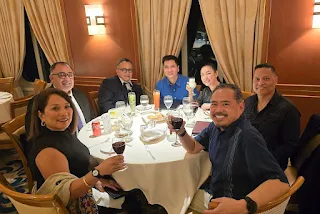For this week’s Wednesday Wisdom, we turn to a timeless quote from Rumi that speaks volumes about the journey many Filipino-Americans find themselves on.
“Maybe you are searching among the branches for what only appears in the roots.” — Rumi
For many Fil-Ams, our relationship with Filipino culture is filtered through distance—both literal and emotional. We grow up speaking English, celebrating Thanksgiving more fully than Buwan ng Wika, and recognizing family more as an abstract value than a daily, lived-in practice. We may know adobo, but not the story behind it. We might say “po” and “opo” when prompted by our elders, but have no idea why. And often, we feel a sense of cultural guilt for not knowing enough.
That’s where Rumi’s words come in—and they’re echoed by our own national hero, Dr. José Rizal, who famously said:
“He who does not know how to look back at where he came from will never get to his destination.” — José Rizal
Rumi and Rizal, separated by continents and centuries, speak the same truth: understanding our future starts by returning to our roots. Identity isn’t something we piece together from fragments at the edge—it’s something we uncover at the source. The Filipino identity, for all its global complexity, is rooted deeply in ancient traditions, values, and a shared history of resilience, creativity, and connection. When we return to those roots—not just what’s trendy or visible—we begin to understand ourselves with deeper clarity.
🌱 What Are the Roots?
To find the roots of Filipino identity, we must look beyond media portrayals and fast facts. It’s not just in knowing how to pronounce “Mabuhay!” or following Filipino celebrities. The roots are found in:
- Bayanihan: A communal spirit of helping one another, deeply woven into the Filipino psyche long before it became a social media buzzword.
- Kapwa: A core value that sees others not as "others" but as extensions of the self. It’s the soul of Filipino relational culture.
- Pre-colonial Wisdom: The myths, rituals, and indigenous spiritualities that predate Spanish rule and still quietly inform how many Filipinos live and relate to the world.
- Oral Histories and Storytelling: Your Lola’s bedtime stories, your Tito’s tales of growing up in the province—these are cultural archives as valid as any textbook.
- Resistance and Resilience: From Lapu-Lapu to modern-day OFWs, the Filipino spirit is a story of fighting for dignity, often with humor and hope as our weapons.
🌸 Re-rooting as a Fil-Am
So how do we re-root ourselves? Here are some small but powerful steps:
- Ask questions: Interview your parents, grandparents, titos, and titas. Ask them what life was like back in the Philippines, what they feared, loved, and hoped for.
- Learn the language: Not just Tagalog, but Ilocano, Kapampangan, Bisaya. Each dialect opens up a different flavor of the culture.
- Explore pre-colonial and indigenous culture: Discover the babaylan, the baybayin script, and the wisdom encoded in folk songs and dances.
- Participate in cultural events not just to spectate, but to embody: Dance the tinikling, join a community cooking session, or attend a fiesta abroad with full-hearted curiosity.
- Embrace the contradictions: You’re not less Filipino because you don’t speak fluent Tagalog. You’re not less American because you practice pamamanhikan. You are both. Own the hybridity.
🌳 In the End, It’s About Belonging
When Rumi speaks of searching among the branches, he points to the tendency we all have to look outward, especially when we feel culturally unmoored. But the beauty of the Filipino identity is that it’s not just skin-deep or performance-based. It’s an inheritance. It lives in the food we cook, the jokes we share, the songs we hum, the way we care for our families even when we’re oceans apart.
For the Fil-Am community, reconnecting with the roots isn’t about returning to a mythical, “pure” Filipino past. It’s about deepening the relationship with the parts of ourselves that have been there all along, waiting quietly under the surface.
So, if you feel lost, fragmented, or not “Filipino enough,” take a breath. Maybe what you’re looking for isn’t up in the branches.
Maybe it’s already in your roots.
🔗 Got a story to share about reconnecting with your Filipino roots? Drop it in the comments or tag us @PinoyBuilt—let’s grow this community together. 🌍❤️🇵🇭
#WednesdayWisdom | Rooted culture is empowered culture. Stay grounded, stay proud.













1 Comments
Wed is Wednesday Wisdom. It's also Garbage Day in my 'hood. Have a great day all.
ReplyDeleteHi! Thank you for dropping by. Please leave us a comment.